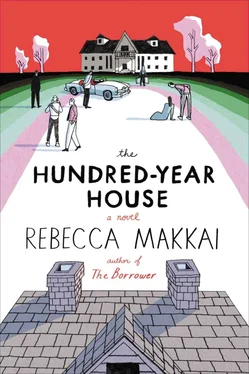The leaves were working out nicely. There was something new, a depth she could normally achieve only with many layers of oil, but that somehow came through now with just the thinnest washes. Now that she was this far from him, she was painting, in a sense, for Viktor. Though she’d never admit it aloud. And if he visited her studio along with everyone else at the end of her stay, why would he assume this particular pile of oak leaves had to do with him?
When she’d walked, travel-weary, into the library three weeks ago and seen him there, sitting as always, cigar and drink, legs halfway across the rug, she’d been shaken to the core, but only in the most familiar of ways. This time, she’d have been more surprised if he’d not been there. This was the third stay for both, and the third time their visits had coincided. He didn’t need to tell her he hadn’t arranged it this way: The blanching of his face was enough. It wasn’t Samantha’s doing, either — Samantha, who, in ’27, asked them in all earnestness if they’d overlapped before. Zilla had come to feel the house itself was responsible, a magnetic field drawing them both back at regular intervals.
In March of ’25, right after her first solo show, she’d come here to recover, to try to make something she didn’t loathe as much as the work she’d just stared at till she wished for blindness. When she first saw him, Viktor was arriving late to dinner. His walk from the train had half frozen him, and he hadn’t shaved in days. His hair — she’d thought it was the ice freezing it out like that in all directions. He sat next to her and said very little. She asked him for the salt without even looking at him — an elderly playwright was holding forth on hermaphrodites — and Viktor took her hand and uncoiled her fingers, tilted the shaker so the salt poured slowly into her palm. She turned, and he locked up her eyes in some kind of cage with his own, so that she couldn’t turn away. Everyone began laughing and thought it a great joke, but really something far stranger was going on, something to do with her spinal column and her entire future. Her hand grew heavy. The salt began to spill over the edges and between her fingers. It was a long time — a minute? five minutes? — till he gave the container a last shake and set it down, and there she sat, dopey, buried under a mountain of a million small things. She pinched a few grains off the top for her casserole, and sat there eating the rest of her meal with her hand still outstretched, still laden. She said nothing at all, and this became a source of tremendous amusement for the rest of the table. They tried to remember which Roman goddess it was she resembled, and whether there might have been, once, a salt-bearing oracle. For the rest of that stay, the whole group called her The Oracle. She resumed talking the next morning, and found she had become such an object of fascination to the other artists that they all wanted to hear whatever she said. They wanted to ask The Oracle their futures. “How burnt shall dinner be?” “When will my poems ever be done?” “Which painting will sell?”
But she was caught up, meanwhile, in watching Viktor. His clothes were always too small or too large, or both. His eyes bugged out, so dark a brown that you couldn’t tell iris from pupil. She’d thought him tremendously ungraceful for a dancer at first, until she understood his problem: He was meant to move in empty and infinite space, not to interact with chairs and lamps and soup spoons. Still, every muscle engaged in whatever he did. No movement was isolated to just the hand, or just the leg. Each action had behind it the force and eloquence of his entire body.
The next night there had been a storm, one of those violent Midwestern ordeals she was still unaccustomed to. They’d been gathered in the library after dinner, and midway through the first round of drinks Zilla had confessed how terrified she was of the thunder, of the lightning hitting her in bed as she slept. Viktor had rested his cigar in the ashtray, and left the room. They’d laughed about where he’d gone — he felt a dance coming on! — but twenty minutes later he was back, soaked like a shipwrecked sailor, teeth clacking, hair improbably still erect. He extended his palm, a wet, black acorn in the middle. He said, “For your windowsill. To protect you.” It was a tradition having to do with Thor, he explained, being god of both the oak trees and the lightning. The whole crowd had laughed again, but this time with — she thought she heard it — an edge of wonder and knowing and general romantic envy. This man must be in love with this woman. But we haven’t yet spoken! she wanted to say. Later they would speak. They’d spend hours on the terrace, always with others, laughing about failure and rent parties and a thousand other things.
She hadn’t thought of it till now, but this must be why she’d chosen oak leaves to paint. Of course. How dense, not to realize.
A knocking below.
“Yes!” she called. “Yes, yes, yes.”
And here, hurrying up, were Samantha and Ludo, and trailing behind was Armand, the illustrator, the sweet golden one with the odd teeth.
Samantha’s eyes were bright and wet. “We’ll need to hide Ludo up here. Tonight at dinner, and after. You know Gamby thinks he’s gone. I swore.”
“You no mind?” Ludo said. “I leave alone your paint.” He appraised the room.
Zilla took Samantha’s wrist and led her gently to the rolling stool. “Sit down,” she said. “Breathe great slow breaths.”
She found chairs for the men and a crate for herself, and they sat by an open dormer, where an electric fan fought a losing battle with the heat.
Samantha said, “I’ll offer Gamby the extra bed in the director’s house, but I’m sure he’ll stay at the hotel. Either way, Ludo should be safe to sleep in his room. I mean, just at night. I don’t imagine Gamby will stay more than a day or two. Unless he kicks us out and stays forever .”
“He won’t,” Ludo said.
“He will. He actually will.”
Ludo was a frenetic little man. It had been two years since he and Zilla had made love ( love , ha!) in the composer’s cottage, since Viktor had hit him in the mouth with a dinner plate the next day — also, not coincidentally, the last day Viktor had spoken directly to her — and she could remember nothing at all about the feel of Ludo’s body, his smell, his tongue. He looked at her with equal vacancy.
Samantha said, “This morning I wrote to the board. Some are my friends, but most aren’t. I don’t know how much sympathy we have.”
Armand, quiet till now, let out a loud breath, a dragon puffing contemplative steam. “What would he take from New York? The Broadway, or the Twentieth Century? Well, no, it doesn’t matter. They both get to the city in the morning. Let’s say he’s there now, he’ll have to switch to the local, maybe he’ll have lunch first. We have a few hours.”
“To do what?”
“I haven’t a clue.”
Ludo said, “I quote you Ovid, but I don’t know in the English: Fortune is not helping those who pray but those who act.”
“Didn’t Ovid get exiled?”
Armand said, “Stay here.” He vanished down the stairs, and they all stared after him, bemused, and then in seconds he came running back. He put something on the windowsill: a little monkey, carved from green jade. Loopy arms, a manic grin. “It’s the Lord of Mischief,” he said. “A relic of my dissolute years in the Orient. He’ll be our totem.”
Samantha stared at the thing. “I thought you’d be coming back with an idea.”
“Well, no.”
Zilla rubbed Samantha’s neck. She said, “We could either seduce him or kidnap him. I believe these are our options.”
Читать дальше












